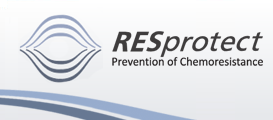| Combating Chemoresistance |

|

|

|
Page 1 of 4 Combating Chemoresistance –Chemogenomics Joins the Battleground
Drugs that prevent or inhibit induction of chemoresistance are beset Rudolf Fahrig is Professor at the University of Hamburg, Germany, and CEO of RESprotect GmbH. He served for many years in several national and international scientific committees and on the editorial boards of scientific journals. His work, resulting in a drug that prevents induction of chemoresistance, received the ‘Central German Innovation Prize’ in 2005. Rudolf studied Biology at the University of Hamburg, the Free University, Berlin, the University of Vienna, Austria and the Justus-Liebig-University. In cancer model systems, chemoresistance is often mediated by a single gene, and therefore may in theory be inhibited by any drug that targets the product of that gene. All these drugs possess potency and specificity for only one of the several reasons for chemoresistance. In this respect, the chemogenomics approach focuses on small molecules, causing favourable phenotypic changes, and inhibiting or preventing the induction of chemoresistance. The drugs have to counteract the over-expression of apoptosis-antagonising genes and to enhance immune responses. By influencing not only one but a number of different validated targets, a new class of effective anticancer drugs will be developed. These compounds have to be given in addition to standard chemotherapy. RP101 (BVDU) is the first drug that shows these effects in vitro and significantly extended patient survival rate in a clinical pilot study. Similar tendencies are observed in a second study that has started recently.
|
||||||



